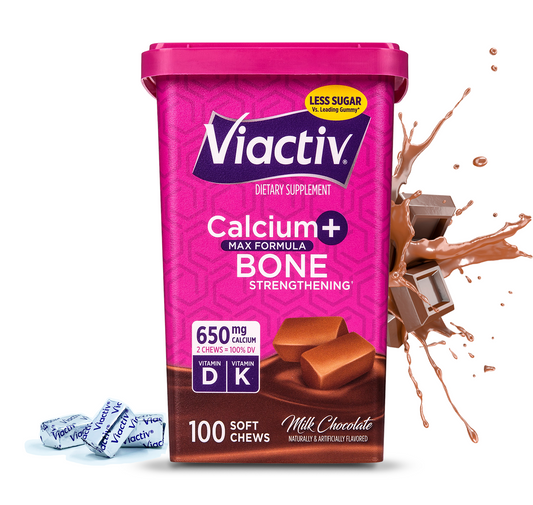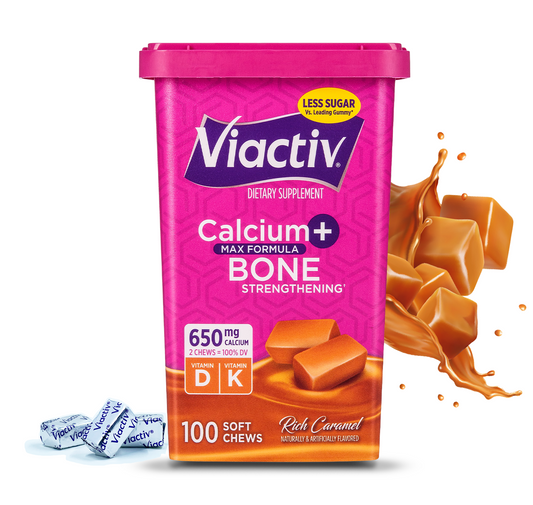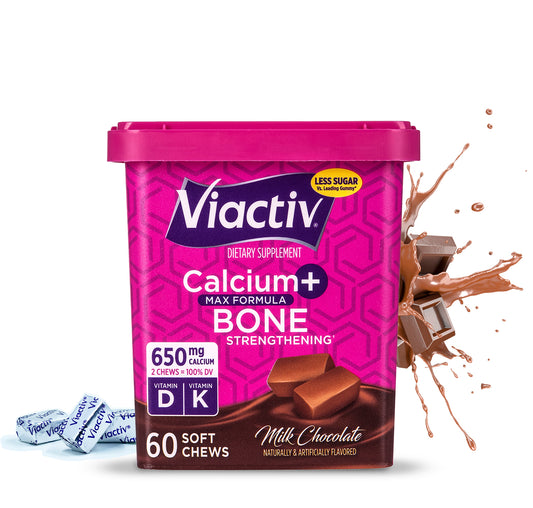Key Takeaways:
-
Calcium and Vitamin D May assist to keep PMS at a manageable level
-
Calcium plays a big part in a comfortable monthly cycle
-
Calcium is needed to maintain healthy muscle contraction.
-
Omega-3s in addition to calcium helps maintain muscle cramping associated with PMS
Women hold a unique role in society – they are often the caretaker of the family, in charge of managing their own lives while also helping those around them. What puts women in this position? An easy answer is their reproductive system. Once a woman’s body hits a certain maturation, the body naturally begins to prepare for pregnancy. When no pregnancy occurs, menstruation (a period) occurs as part of a woman’s monthly menstrual cycle instead. Every woman – whether you’re a mother, daughter, wife, sister, grandmother, etc. – has been impacted by a period in one way or another. Sometimes a period is positive, as it’s the thing that allows a woman to become a mother, whereas other times a period can be negative, causing extreme monthly discomfort for those not trying to get pregnant. This discomfort is often referred to as PMS (Premenstrual Syndrome).
Calcium for PMS
 PMS affects millions of women in many ways; 70-90% of reproductive age women have reported some type of PMS symptom. Several studies suggest that using specific supplements, including calcium and vitamin D, may provide necessary nutrients to help maintain a comfortable level of PMS. Why? Well, female calcium and vitamin D levels fluctuate monthly as estrogen does its thing throughout the menstrual cycle. Specifically for women with PMS symptoms, calcium seems to drop more sharply at ovulation. Drops in calcium affect PMS symptoms because ovulation uses calcium for two big jobs during this time of the month: 1) supporting the transportation of oxygen and hormones through the circulatory system and 2) supporting the muscular system with healthy muscle contraction and relaxation.
PMS affects millions of women in many ways; 70-90% of reproductive age women have reported some type of PMS symptom. Several studies suggest that using specific supplements, including calcium and vitamin D, may provide necessary nutrients to help maintain a comfortable level of PMS. Why? Well, female calcium and vitamin D levels fluctuate monthly as estrogen does its thing throughout the menstrual cycle. Specifically for women with PMS symptoms, calcium seems to drop more sharply at ovulation. Drops in calcium affect PMS symptoms because ovulation uses calcium for two big jobs during this time of the month: 1) supporting the transportation of oxygen and hormones through the circulatory system and 2) supporting the muscular system with healthy muscle contraction and relaxation. Calcium and Muscle Contraction

How much calcium is needed to support our muscles on an individual basis can be hard to track. Absorbing calcium varies by age, whether vitamin D is present or not, hormonal status, and the body’s need for calcium at a given life stage. For example, calcium absorption is highest during pregnancy and lowest in “old age.” Research supports that people with PMS are more likely to be deficient in calcium and vitamin D3, and proper supplementation can help with uncomfortable symptoms.
Calcium and Vitamin D May Reduce PMS Symptoms

Calcium to the rescue! One study followed a group of healthy premenopausal women, ages 18 – 54 for a minimum of two menstrual cycles. These women were randomly selected to supplement with 1,200 milligrams of calcium daily or a placebo. Many variables were reviewed including maintenance of emotional and physical wellbeing. This research showed that the calcium group had a significant reduction in fatigue, swelling, and muscle cramping because of PMS. This research supports that women who have diets rich in vitamin D and calcium can reduce or even eliminate PMS symptoms; consistent intake of calcium and vitamin D3 has also supported reducing the chance of developing PMS. So, better still, women are at a lower risk of developing PMS symptoms by ensuring that their diets incorporate consistent and adequate levels of calcium and vitamin D.
How to Get Enough Calcium?

Incorporating calcium into your daily eating habits should be a nutritional foundation. Like many adults, consuming dairy products may be a challenge. Not to worry, there is a great variety of plant-based food choices that provide higher amounts of calcium. For example, enjoy a salad with a base of green, leafy vegetables such as spinach, kale, and/or broccoli. Add some white beans, dried figs, sliced oranges, or sliced kiwi, and top with a sprinkle of cheese for a delicious, calcium-packed lunch. You can also get calcium in liquid forms through fortified drinks such as orange juice, soy milk, or almond milk, or add some blackberries and enjoy a calcium rich smoothie. The most consistent way to ensure that you are receiving the daily recommended amount of calcium in addition to your meal plan is to supplement. Viactiv calcium chews deliver 650mg of calcium and 500IU of vitamin D3 in each serving. That’s the same amount of calcium in 2 glasses of milk in just one calcium chew, on top of all the benefits of vitamin D3. In addition to Viactiv calcium chews, did you know Viactiv has an omega-3 supplement as well? Omega-3s are another great supplement for PMS symptoms.
Omega-3s and Calcium for PMS

One family of nutrients essential for our health that cannot be made or stored by the body are omega-3s. Your diet must include them, or you are not getting them. The most abundant omega-3s are called Alpha Linolenic Acid (ALA), Eicosapentaenoic Acid (EPA) and Docosahexaenoic Acid (DHA). ALA comes from plants like nuts, seeds, and green leafy vegetables. Unfortunately, your body must convert ALA to EPA and DHA for the nutrients to be useful because these are not a preformed omega-3 fatty acid. On the other hand, EPA and DHA can be immediately beneficial when consumed; they are “preformed” Omega-3s.
In one small study, 21 young women took EPA and DHA omega-3s daily for two months. Another 21 young women took a placebo for two months. The results suggested that the women taking the fish oil experienced significantly less menstrual cramps. Viactiv Calcium Chews is a great supplement that may help PMS symptoms.
Sources
37 Calcium-Rich Foods Beyond a Glass of Milk | Prevention
Dietary Reference Intakes for Calcium and Vitamin D | PubMed.gov
Calcium: Fact Sheet for Health Professionals | National Institutes of Health (NIH)
Supplementation with Omega-3 Polyunsaturated Fatty Acids in the Management of Dysmenorrhea in Adolescents | National Institutes of Health (NIH)
Last Updated On: June 8, 2023
First Published On: December 14, 2022





